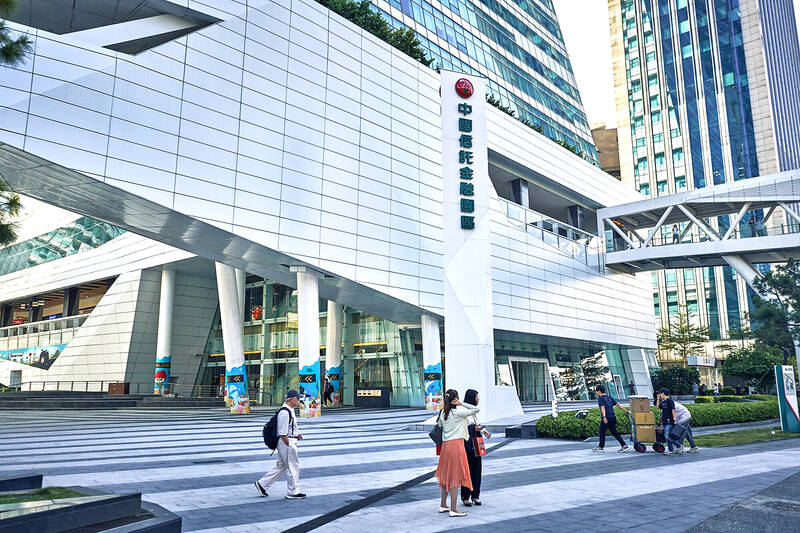Taiwanese need about NT$15 million (US$466,200) to maintain a comfortable lifestyle in retirement, but nearly 80 percent said they lack the finances to meet that target, a survey released on Tuesday by CTBC Bank (中國信託銀行) showed.
Retirement planning has rapidly grown in importance as Taiwan is set to become a “super-aged society” next year when people aged 65 and older account for 20 percent of the population, CTBC retail banking chief Yang Shui-hui (楊淑惠) said.
The issue must not be taken lightly with life expectancy in Taiwan increasing with medical and technology breakthroughs, she said.

Photo: An Rong Xu, Bloomberg
Taiwan’s current life expectancy is 81.21 years, suggesting a 0.21 percent increase from last year, according to government data, which showed a similar rate of growth in the past three years.
Most respondents said they would need an estimated NT$14.27 million to maintain a decent lifestyle after retirement, while 20 percent said they needed NT$25 million, the survey showed.
Eighty-seven percent of the respondents said they use investment tools to manage their wealth, while more than 50 percent reported investment returns of more than 5 percent in the past three years, it said.
Still, 53 percent describe market movements as “evasive” and are worried about their long-term investments, it said.
Stocks were cited as the most popular investment tool among respondents, accounting for 66.9 percent, followed by fixed-term deposits at 62.9 percent and exchange-traded funds (ETFs) at 41.9 percent, it said.
ETFs have overtaken savings-related insurance policies as the third-favorite investment vehicle, with 55 percent of respondents saying they preferred investment products that promise regular and stable cash flows.
That helped account for the surge in scale of local ETFs that feature monthly or quarterly distributions of cash dividends, CTBC Bank said, adding that a growing number of Taiwanese are counting on passive income from ETFs to sustain their lifestyle after retirement.
Nevertheless, 34.9 percent said they do not have a designated retirement account, while 34.8 percent said they worry that no one would take care of their children or sick family members after their death, and 16.1 percent said they worry about a lack of knowledge about whom and how to pass on their wealth, the survey showed.
As for what they want in retirement, good health is considered the most valuable at 81 percent, followed by traveling the world at 55 percent, and developing hobbies and habits at 23 percent, it said.
CTBC Bank conducted the poll from July 26 to Aug. 15 with 1,200 people older than 30.

Taiwan Semiconductor Manufacturing Co (TSMC, 台積電), the world’s biggest contract chipmaker, booked its first-ever profit from its Arizona subsidiary in the first half of this year, four years after operations began, a company financial statement showed. Wholly owned by TSMC, the Arizona unit contributed NT$4.52 billion (US$150.1 million) in net profit, compared with a loss of NT$4.34 billion a year earlier, the statement showed. The company attributed the turnaround to strong market demand and high factory utilization. The Arizona unit counts Apple Inc, Nvidia Corp and Advanced Micro Devices Inc among its major customers. The firm’s first fab in Arizona began high-volume production

VOTE OF CONFIDENCE: The Japanese company is adding Intel to an investment portfolio that includes artificial intelligence linchpins Nvidia Corp and TSMC Softbank Group Corp agreed to buy US$2 billion of Intel Corp stock, a surprise deal to shore up a struggling US name while boosting its own chip ambitions. The Japanese company, which is adding Intel to an investment portfolio that includes artificial intelligence (AI) linchpins Nvidia Corp and Taiwan Semiconductor Manufacturing Co (TSMC, 台積電), is to pay US$23 a share — a small discount to Intel’s last close. Shares of the US chipmaker, which would issue new stock to Softbank, surged more than 5 percent in after-hours trading. Softbank’s stock fell as much as 5.4 percent on Tuesday in Tokyo, its

COLLABORATION: Softbank would supply manufacturing gear to the factory, and a joint venture would make AI data center equipment, Young Liu said Hon Hai Precision Industry Co (鴻海精密) would operate a US factory owned by Softbank Group Corp, setting up what is in the running to be the first manufacturing site in the Japanese company’s US$500 billion Stargate venture with OpenAI and Oracle Corp. Softbank is acquiring Hon Hai’s electric-vehicle plant in Ohio, but the Taiwanese company would continue to run the complex after turning it into an artificial intelligence (AI) server production plant, Hon Hai chairman Young Liu (劉揚偉) said yesterday. Softbank would supply manufacturing gear to the factory, and a joint venture between the two companies would make AI data

The Taiwan Automation Intelligence and Robot Show, which is to be held from Wednesday to Saturday at the Taipei Nangang Exhibition Center, would showcase the latest in artificial intelligence (AI)-driven robotics and automation technologies, the organizer said yesterday. The event would highlight applications in smart manufacturing, as well as information and communications technology, the Taiwan Automation Intelligence and Robotics Association said. More than 1,000 companies are to display innovations in semiconductors, electromechanics, industrial automation and intelligent manufacturing, it said in a news release. Visitors can explore automated guided vehicles, 3D machine vision systems and AI-powered applications at the show, along